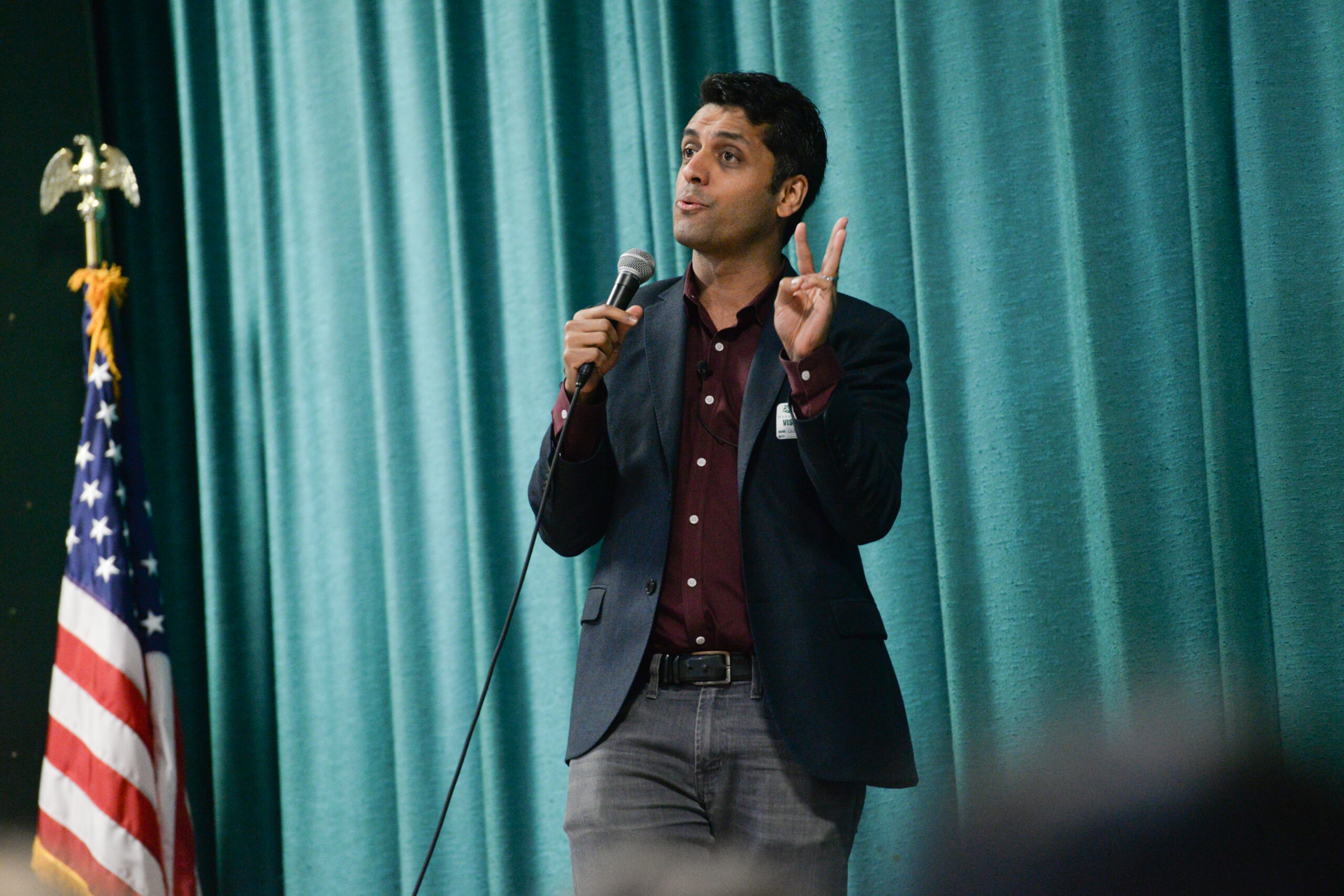This article originally appeared in the winter 2015 Harker Quarterly.
During his recent appearance as a guest speaker at Harker’s upper school, Al-Jazeera America’s “The Stream” co-host Wajahat Ali MS ’94 reflected on his time at Harker and engaged the packed audience with stories about his work and life as a Muslim-American.
Born to Pakistani immigrant parents, Ali attended Harker from 1986 to 1994. He joked to an enthusiastic, receptive crowd about having lentil stains on his shirt, only speaking Urdu until the age of 5, and being “born and raised in ‘Fremont-istan,’ California.”
The alumnus also spoke fondly about a favorite lower school teacher, Sue Peterson, whom he credits with helping to push him toward becoming the professional playwright, journalist and public speaker he is today.
“She had asked us to write a one-page story. I ended up writing 10 pages. She told me it was a great story and had me recite it in front of the entire class, and then again at a talent show for older students,” recalled Ali, during the assembly held on the morning of Sept. 19 in the upper school gym. “That was the first time I realized I had power in my voice, because I shared my story.”
Ali visited Harker at the request of senior Shay Lari-Hosain, editor-in-chief of Wingspan, the upper school’s long-form magazine. Lari-Hosain, who introduced Ali at the assembly, had previously interviewed him for a Wingspan story about issues that Muslim-Americans face. That article got picked up by a leading English-language newspaper in Pakistan. Following the introduction, Ali took the podium, discussing not only his days at Harker, but his time as a student at the University of California, Berkeley, and how that led to publishing his play “The Domestic Crusaders” in New York. The play, which centers around a Muslim-American family coming together and dealing with their problems, was the first thing Ali had published. It broke box office records at Nuyorican Poets Cafe in New York and received the 2011 Otto René Castillo Award for Political Theatre.
After a stint as a freelance correspondent at news organizations including CNN and the Wall Street Journal, Ali went on to become a co-host at Al-Jazeera, despite various struggles, even briefly being homeless and living in a shelter at the age of 30.
Before that, as a young college student, he experienced his first real taste of bigotry after the Sept. 11 terrorist attacks in 2001. Then a senior at UC Berkeley and the head of the university’s Muslim Student Association, he recalled how, in the post-9/11 climate, he was forced to become a “professional Muslim,” constantly defending his role of student leader and activist.
“As a ‘professional Muslim,’ you have to be a walking Wikipedia article … an instant expert on Islam, Qur’an, Shari’a, Hamas, hummus, Fatah, fatwas, Iran [and] Salman Khan,” he said, jokingly, but nonetheless making a serious point.
Throughout his address, he stressed the importance of being true to yourself, and not being pressured by the standard Silicon Valley “checklist” of success (what he called the “Holy Trinity”) to become a lawyer, doctor or engineer.
“Blow up the checklist. … Be the most authentic version of yourself,” he advised the students in attendance. “If you fall, hope you have the courage to raise your hand out and have faith that someone will pick you up, and once you guys make it, which you will, my request for you is to reach out across the aisle and help that dude who might be seen as a problem.”
Ali received a standing ovation after concluding his talk by stressing the far-reaching importance of storytelling among minorities, especially youth. His own future plans include continuing to tell his stories with a possible book project in the works.
“I loved how Wajahat Ali was able to connect with the students. His stories were funny, relatable, and carried a deeper message. I have never in my seven years at Harker seen so many students walk out of an assembly smiling and inspired. I was surprised that he spoke more about his life story than discrimination per se, but I think that it carried his message effectively,” observed Michael Zhao, grade 12.
Lari-Hosain said he was thrilled that Ali’s visit was such a success and still generating continued conversation among upper school students and faculty alike. (To read a story about Lari-Hosain’s outreach work in Pakistan: https://staging.news.harker.org/grade-12-student-spends-summers-performing-outreach-work-in-pakistan/.)
“He was an inspiring figure,” said Elisabeth Siegel, grade 12, “navigating through hurdles and setbacks left and right. He gave the audience a much-needed perspective, especially in the current political climate of the world, of what life was like growing up Muslim in America, a religious minority group that went from being the object of ignorance of a majority of Americans pre-2001 to the religious minority considered by a good portion of Americans to be a demographic threat.”
After the assembly Ali participated in an informal question and answer session with about 40 students in the journalism room. He then took part in a diversity discussion in math teacher Lola Muldrew’s classroom.
“Allow yourself the space to fail. Make up your own checklist,” Ali reiterated during those subsequent discussions.
